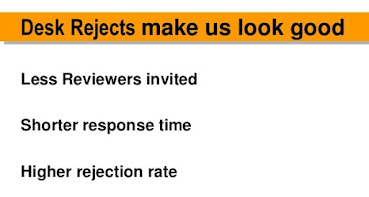“The number of desk rejections has risen dramatically in the last decade, and today desk rejection rates for top-tier journals can be as high as 50–80% of submitted…"https://link.springer.com/article/10.1007/s11192-021-03918-x#Sec5
The paper above recently published in the journal Scientometrics is a sound exercise of naivete (or hypocrisy). It almost seems that its authors ignore that Editors main concern is to increase the impact factor of their journals and since science already showed that papers from highly cited scientists and from authors affiliated with top universities get more citations then it's rather obvious that those papers are less likely to be desk rejected, thus discriminating against young researchers and researchers from less developed countries. Furthermore, it's most strange that the authors of this paper have in a very opportunistic way forgotten to cite the important work of Siler et al. (2015) (that i mentioned in the email below in which I criticized the desk rejection policy of an Editor-in-Chief) that showed many high-quality papers are wickedly desk rejected by Editors.
________________________________________
Below some extracts of an Editorial authored by Leonard Leibovici, Editor-in-chief of a Medicine journal published by Elsevier. https://www.journals.elsevier.com/clinical-microbiology-and-infection/
It contains several interesting statements trying to explain why 60% of the papers in his journals are desk rejected. What it does not contain is an explanation about why journals can only publish a limited number of articles. It would be more honest if he said that publishing more articles could damage their impact factor. The fact is that this Editor-in-Chief, like many other editors, are not infallible, so when he says that he reject papers because they are not of interest to the readers of that journal that is just a guessing game at best, and as other editors, he will also desk reject high-quality articles. A study published on PNAS shows exactly that http://www.pnas.org/content/112/2/360.abstract
The idea that in the 21-century editors decide what readers are interested in is not just condescending but almost insulting. It's an arrogant move for an editor-in-chief to come forward revealing that his journal desk rejects 60% of the papers. I never signed or even agreed with the widely known Elsevier boycott but Journals with such high desk rejection should indeed be boycotted by the scientific community. The time will come when journals will ask (and even pay) authors to publish their work and not the other way around because it's authors and not journals (or editors) that generate the most part of the multi-billion value of the publishing industry.
